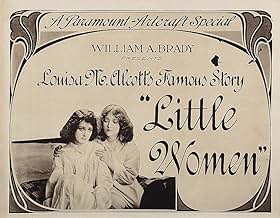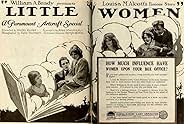Ajouter une intrigue dans votre langueJo March and her sisters Meg, Beth, and Amy live in a happy family in Concord, Massachusetts. Jo yearns to be a writer, and through the course of the years, finds much within her own family ... Tout lireJo March and her sisters Meg, Beth, and Amy live in a happy family in Concord, Massachusetts. Jo yearns to be a writer, and through the course of the years, finds much within her own family to write about.Jo March and her sisters Meg, Beth, and Amy live in a happy family in Concord, Massachusetts. Jo yearns to be a writer, and through the course of the years, finds much within her own family to write about.
Florence Flinn
- Amy March
- (as Florence Flynn)
Nellie Anderson
- Hannah
- (as Mrs. Anderson)
Frank DeVernon
- Mr. Lawrence
- (as Frank de Vernon)
Nadia Gary
- Mr. March & Marmee Grandchild
- (non crédité)
Douglas Redmond
- Meg's Child
- (non crédité)
- …
Baby Ivy Ward
- Meg's Child
- (non crédité)
- …
Histoire
Le saviez-vous
- AnecdotesThis second incarnation of the Louisa May Alcott story was expensively produced by World Film, an independent company founded by famed Broadway producer William A. Brady (father of Alice Brady); unable to find a suitable distributor, it sat on the shelf for nearly a year before a deal was struck with Paramount Pictures' Artcraft, a division Adolph Zukor created exclusively for A-list product (lesser pictures were handed off under its Realart division), with the bulk of his mainstream productions released under the Paramount label. This three-tiered system was abolished within five years.
- GaffesAlthough the film is set in the 1860s, a telegram shown reveals the name of the then current (1918) president of the Western Union telegraph company, Newcomb Carlton (b. 1869).
- ConnexionsReferenced in A Night at the Movies: Merry Christmas! (2011)
Commentaire à la une
"Louisa M. Alcott's 'Little Women', a story well-loved by sixteen-year-olds, idealists, and admirers of the Pollyanna and Elsie Dinsmore philosophy, has been picturized into a photoplay which possess the charm of an old miniature, the simplicity of life before women wanted the vote, and the tearful sweetness of 'Home Sweet Home'. In fact, it is so nearly classic of the photoplay that we wish it could be just a little bit better. For, it must be admitted, the unrolling film moves too slowly in spots," according to Hazel Simpson Naylor's review in "Motion Picture Magazine" (February 1919).
"There is a tendency upon the part of the director, Harry Knoles, to allow his characters to sit about the home chair too long, for a photoplay should always be on the wing of development. Also, the part of Professor Baer is not made distinctive enough. Otherwise, 'Little Women' will live up to your mind picture of the book. Especially does Dorothy Bernard ideally typify our beloved Jo, while Isabel Lamon as Meg, Lillian Hall as Beth, and Florence Flinn as Amy are all excellently cast. Conrad Nagel makes an ideal Laurie."
These sentiments were echoed in "Motion Picture Classic" (February 1919), where reviewer Frederick James Smith found fewer faults. "Dorothy Bernard is delightful as Jo, and Conrad Nagel is a very likable Laurie," he declared, praising the film's "gentle atmosphere." A major early silent film actress, Ms. Bernard looks beautiful in photographs promoting the movie.
"The New York Times" (November 11, 1918) reported the film was "a good piece of work" that would likely delight readers of the original books, with "satisfactory" acting, albeit possessing "too much conscious posing and a lack of character delineation" at times. Most interestingly, the "Times" reported the film was made, "Owing to the co-operation of the Alcott Memorial Committee in permitting scenes of the photoplay to be made in and about the author's home in Concord, Mass.," thus giving it an authentic 1860s New England atmosphere. Produced by William A. Brady, this film is unfortunately presumed lost.
****** Little Women (11/10/18) Harley Knoles ~ Dorothy Bernard, Isabel Lamon, Conrad Nagel, Henry Hull
"There is a tendency upon the part of the director, Harry Knoles, to allow his characters to sit about the home chair too long, for a photoplay should always be on the wing of development. Also, the part of Professor Baer is not made distinctive enough. Otherwise, 'Little Women' will live up to your mind picture of the book. Especially does Dorothy Bernard ideally typify our beloved Jo, while Isabel Lamon as Meg, Lillian Hall as Beth, and Florence Flinn as Amy are all excellently cast. Conrad Nagel makes an ideal Laurie."
These sentiments were echoed in "Motion Picture Classic" (February 1919), where reviewer Frederick James Smith found fewer faults. "Dorothy Bernard is delightful as Jo, and Conrad Nagel is a very likable Laurie," he declared, praising the film's "gentle atmosphere." A major early silent film actress, Ms. Bernard looks beautiful in photographs promoting the movie.
"The New York Times" (November 11, 1918) reported the film was "a good piece of work" that would likely delight readers of the original books, with "satisfactory" acting, albeit possessing "too much conscious posing and a lack of character delineation" at times. Most interestingly, the "Times" reported the film was made, "Owing to the co-operation of the Alcott Memorial Committee in permitting scenes of the photoplay to be made in and about the author's home in Concord, Mass.," thus giving it an authentic 1860s New England atmosphere. Produced by William A. Brady, this film is unfortunately presumed lost.
****** Little Women (11/10/18) Harley Knoles ~ Dorothy Bernard, Isabel Lamon, Conrad Nagel, Henry Hull
- wes-connors
- 14 déc. 2010
- Permalien
Meilleurs choix
Connectez-vous pour évaluer et suivre la liste de favoris afin de recevoir des recommandations personnalisées
Détails
- Date de sortie
- Pays d’origine
- Langues
- Aussi connu sous le nom de
- Little Women
- Lieux de tournage
- Société de production
- Voir plus de crédits d'entreprise sur IMDbPro
- Durée1 heure
- Couleur
- Mixage
- Rapport de forme
- 1.33 : 1
Contribuer à cette page
Suggérer une modification ou ajouter du contenu manquant

Lacune principale
By what name was L'Accalmie (1918) officially released in Canada in English?
Répondre























